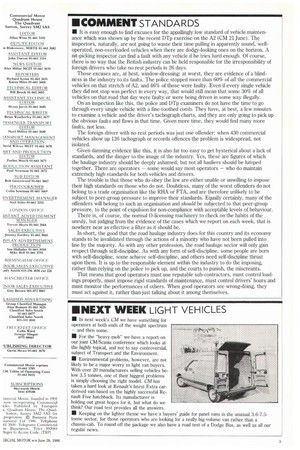• COMMENT STANDARDS • It is easy enough to find
Page 3

If you've noticed an error in this article please click here to report it so we can fix it.
excuses for the appallingly low standard of vehicle maintenance which was shown up by the recent DTp exercise on the A2 (CM 21 June). The inspectors, naturally, are not going to waste their time pulling in apparently sound, welloperated, non-overloaded vehicles when there are dodgy-looking ones on the horizon. A nit-picking inspector can find a fault with any vehicle if he tries hard enough. Of course, there is no way that the British industry can be held responsible for the irresponsibility of foreign drivers who take no rest periods in 26 days.
Those excuses are, at best, window-dressing: at worst, they are evidence of a blindness in the industry to its faults. The police stopped more than 60% of all the commercial vehicles on that stretch of A2, and 46% of those were faulty. Even if every single vehicle they did not stop was perfect in every way, that would still mean that some 30% of all vehicles on that road that day were faulty or were being driven in some way illegally.
On an inspection like this, the police and DTp examiners do not have the time to go through every single vehicle with a fine-toothed comb. They have, at best, a few minutes to examine a vehicle and the driver's tachograph charts, and they are only going to pick up the obvious faults and flaws in that time. Given more time, they would find many more faults, not less.
The foreign driver with no rest periods was just one offender: when 430 commercial vehicles show up 126 tachograph or records offences the problem is widespread, not isolated.
Given damning evidence like this, it is also far too easy to get hysterical about a lack of standards, and the danger to the image of the industry. Yes, these are figures of which the haulage industry should be deeply ashamed, but not all hauliers should be lumped together. There are operators — some would say most operators — who do maintain extremely high standards for both vehicles and drivers.
The trouble is that those who do obey the law are either unable or unwilling to impose their high standards on those who do not. Doubtless, many of the worst offenders do not belong to a trade organisation like the RHA or FTA, and are therefore unlikely to be subject to peer-group pressure to improve their standards. Equally certainly, many of the offenders will belong to such an organisation and should be subjected to that peer-group pressure, to the point of expulsion for non-compliance with acceptable levels of behaviour.
There is, of course, the normal 0-licensing machinery to check on the habits of the unruly, but judging from the evidence of the cases which we report on each week, that is nowhere near as effective a filter as it should be.
In short, the good that the road haulage industry does for this country and its economy stands to be invalidated through the actions of a minority who have not been pulled into line by the majority. As with any other profession, the road haulage sector will only gain respect through self-discipline. As with any form of self-discipline, some people are born with self-discipline, some achieve self-discipline, and others need self-discipline thrust upon them. It is up to the responsible element within the industry to do the imposing, rather than relying on the police to pick up, and the courts to punish, the miscreants.
That means that good operators must use reputable sub-contractors, must control loadings properly, must impose rigid standards of maintenance, must control drivers' hours and must monitor the performances of others. When good operators see wrong-doing, they must act against it, rather than just talking about it among themselves.












































































